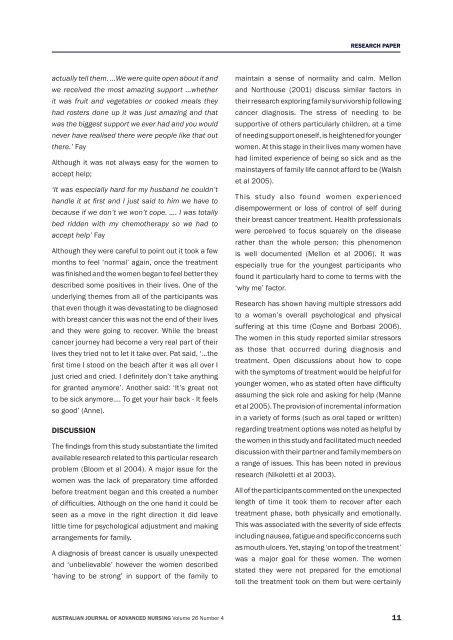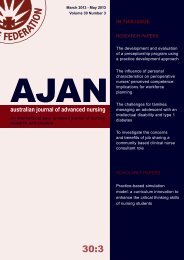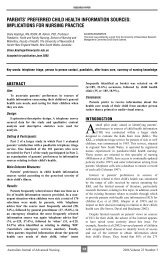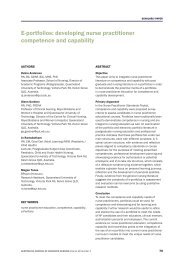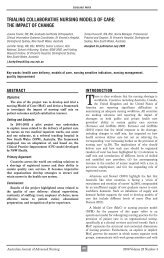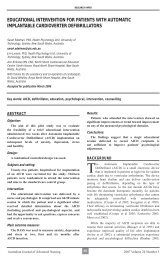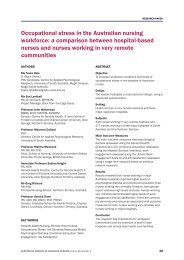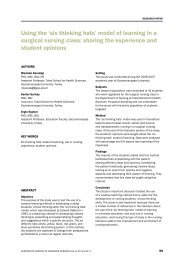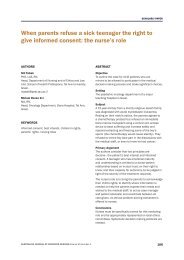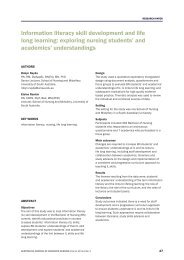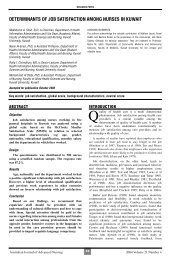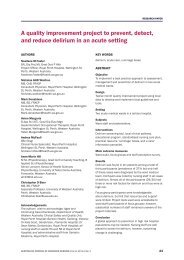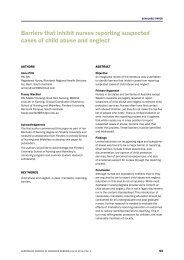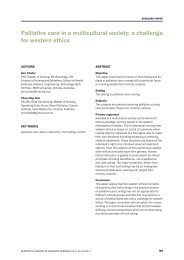australian journal of advanced nursing
australian journal of advanced nursing
australian journal of advanced nursing
You also want an ePaper? Increase the reach of your titles
YUMPU automatically turns print PDFs into web optimized ePapers that Google loves.
actually tell them. …We were quite open about it and<br />
we received the most amazing support …whether<br />
it was fruit and vegetables or cooked meals they<br />
had rosters done up it was just amazing and that<br />
was the biggest support we ever had and you would<br />
never have realised there were people like that out<br />
there.’ Fay<br />
Although it was not always easy for the women to<br />
accept help;<br />
‘It was especially hard for my husband he couldn’t<br />
handle it at first and I just said to him we have to<br />
because if we don’t we won’t cope. …. I was totally<br />
bed ridden with my chemotherapy so we had to<br />
accept help’ Fay<br />
Although they were careful to point out it took a few<br />
months to feel ‘normal’ again, once the treatment<br />
was finished and the women began to feel better they<br />
described some positives in their lives. One <strong>of</strong> the<br />
underlying themes from all <strong>of</strong> the participants was<br />
that even though it was devastating to be diagnosed<br />
with breast cancer this was not the end <strong>of</strong> their lives<br />
and they were going to recover. While the breast<br />
cancer journey had become a very real part <strong>of</strong> their<br />
lives they tried not to let it take over. Pat said, ‘…the<br />
first time I stood on the beach after it was all over I<br />
just cried and cried. I definitely don’t take anything<br />
for granted anymore’. Another said: ‘It’s great not<br />
to be sick anymore…. To get your hair back ‑ It feels<br />
so good’ (Anne).<br />
DISCUSSION<br />
The findings from this study substantiate the limited<br />
available research related to this particular research<br />
problem (Bloom et al 2004). A major issue for the<br />
women was the lack <strong>of</strong> preparatory time afforded<br />
before treatment began and this created a number<br />
<strong>of</strong> difficulties. Although on the one hand it could be<br />
seen as a move in the right direction it did leave<br />
little time for psychological adjustment and making<br />
arrangements for family.<br />
A diagnosis <strong>of</strong> breast cancer is usually unexpected<br />
and ‘unbelievable’ however the women described<br />
‘having to be strong’ in support <strong>of</strong> the family to<br />
RESEARCH PAPER<br />
maintain a sense <strong>of</strong> normality and calm. Mellon<br />
and Northouse (2001) discuss similar factors in<br />
their research exploring family survivorship following<br />
cancer diagnosis. The stress <strong>of</strong> needing to be<br />
supportive <strong>of</strong> others particularly children, at a time<br />
<strong>of</strong> needing support oneself, is heightened for younger<br />
women. At this stage in their lives many women have<br />
had limited experience <strong>of</strong> being so sick and as the<br />
mainstayers <strong>of</strong> family life cannot afford to be (Walsh<br />
et al 2005).<br />
This study also found women experienced<br />
disempowerment or loss <strong>of</strong> control <strong>of</strong> self during<br />
their breast cancer treatment. Health pr<strong>of</strong>essionals<br />
were perceived to focus squarely on the disease<br />
rather than the whole person; this phenomenon<br />
is well documented (Mellon et al 2006). It was<br />
especially true for the youngest participants who<br />
found it particularly hard to come to terms with the<br />
‘why me’ factor.<br />
Research has shown having multiple stressors add<br />
to a woman’s overall psychological and physical<br />
suffering at this time (Coyne and Borbasi 2006).<br />
The women in this study reported similar stressors<br />
as those that occurred during diagnosis and<br />
treatment. Open discussions about how to cope<br />
with the symptoms <strong>of</strong> treatment would be helpful for<br />
younger women, who as stated <strong>of</strong>ten have difficulty<br />
assuming the sick role and asking for help (Manne<br />
et al 2005). The provision <strong>of</strong> incremental information<br />
in a variety <strong>of</strong> forms (such as oral taped or written)<br />
regarding treatment options was noted as helpful by<br />
the women in this study and facilitated much needed<br />
discussion with their partner and family members on<br />
a range <strong>of</strong> issues. This has been noted in previous<br />
research (Nikoletti et al 2003).<br />
All <strong>of</strong> the participants commented on the unexpected<br />
length <strong>of</strong> time it took them to recover after each<br />
treatment phase, both physically and emotionally.<br />
This was associated with the severity <strong>of</strong> side effects<br />
including nausea, fatigue and specific concerns such<br />
as mouth ulcers. Yet, staying ‘on top <strong>of</strong> the treatment’<br />
was a major goal for these women. The women<br />
stated they were not prepared for the emotional<br />
toll the treatment took on them but were certainly<br />
AUSTRALIAN JOURNAL OF ADVANCED NURSING Volume 26 Number 4 11


